Items
 Queen Mary alumnus thought to be the first woman of colour to complete a solo expedition across Antarctica
Queen Mary alumnus thought to be the first woman of colour to complete a solo expedition across Antarctica

Captain Preet Chandi, a Queen Mary University of London alumnus, travelled 700 miles in just 40 days, capping a remarkable achievement.
Date added: Thursday, January 6, 2022
 Optimising treatments for high blood pressure and cardiovascular disease could save lives, according to researchers
Optimising treatments for high blood pressure and cardiovascular disease could save lives, according to researchers

A recent study shows that optimising medicines for high blood pressure and cardiovascular disease patients living in East London could reduce lifetime hospital costs and prevent cardiovascular events such as heart attacks and strokes.
Date added: Friday, January 14, 2022
 Comparing preprints and their finalized publications during the pandemic
Comparing preprints and their finalized publications during the pandemic

A new study involving Queen Mary University of London researchers has explored how preprints compare with their published versions.
Date added: Wednesday, February 2, 2022
 Professor Sir Mark Caulfield appointed VP Health at Queen Mary and President-elect of the British Pharmacological Society
Professor Sir Mark Caulfield appointed VP Health at Queen Mary and President-elect of the British Pharmacological Society

The British Pharmacological Society has announced the appointment of Queen Mary University of London’s Professor Sir Mark Caulfield as its new President-elect.
Date added: Thursday, February 3, 2022
 Researchers investigate previously unappreciated mechanisms in the cancer protective actions of aspirin
Researchers investigate previously unappreciated mechanisms in the cancer protective actions of aspirin

A new study involving researchers from Queen Mary University of London has identified a new role for Specialized Pro-Resolving Mediators in mediating the anti-cancer activities of aspirin. In this research Q&A, study author Professor Jesmond Dalli explains more.
Date added: Thursday, February 3, 2022
 New study shows light-to-moderate coffee consumption is associated with health-benefits
New study shows light-to-moderate coffee consumption is associated with health-benefits

The study by Queen Mary University of London and the Budapest Semmelweis University has shown that having up to three cups of coffee a day has a protective effect on heart health. It also reduces the overall mortality rate and the risk of stroke. The results have recently been published in the European Journal of Preventative Cardiology.
Date added: Thursday, February 10, 2022
 2022 International Day of Women and Girls in Science
2022 International Day of Women and Girls in Science

The International Day of Women and Girls in Science recognises and celebrates the critical role played by women but also aims to promote their full and equal access to participation in science and technology communities. This year we are showcasing the work of some of our inspiring female scientists and recent nominees of the SMD Women in Science Award. Here they tell about their research, what they are proud of, and any future plans for this research.
Date added: Friday, February 11, 2022
 Whole genome sequencing robustly detects the most common inherited neurological diseases and is adopted by healthcare
Whole genome sequencing robustly detects the most common inherited neurological diseases and is adopted by healthcare

Scientists have found whole genome sequencing (WGS) can quickly and accurately detect the most common inherited neurological disorders – something previously thought to be impossible – with the results supporting the use of WGS as a standard diagnostic tool within routine clinical practice.
Date added: Wednesday, February 16, 2022
 New research in mice suggests social interactions and a sense of belonging can boost our immune system
New research in mice suggests social interactions and a sense of belonging can boost our immune system

Researchers from Queen Mary University of London have found that socially housed mice have healthier immune systems than those who are socially isolated – who are more susceptible to longer term issues due to an altered immune system that comes from living alone.
Date added: Tuesday, March 1, 2022
 Queen Mary awarded funding for new healthy ageing networks
Queen Mary awarded funding for new healthy ageing networks

Researchers from Queen Mary University of London have been selected by UK Research and Innovation (UKRI) to create new networks aimed at transforming ageing research in the UK.
Date added: Tuesday, March 8, 2022
 Queen Mary team awarded funding for research project to improve post-surgical outcomes in Africa
Queen Mary team awarded funding for research project to improve post-surgical outcomes in Africa

A team of Queen Mary and African researchers have successfully secured almost £3 million in funding for a new research programme led by Queen Mary’s Professor Rupert Pearse and Professor Bruce Biccard from the University of Cape Town, South Africa.
Date added: Tuesday, April 19, 2022
 Scientists to trial world-first long-acting injection for high blood pressure
Scientists to trial world-first long-acting injection for high blood pressure

Researchers from Queen Mary University of London have been selected by UK Research and Innovation (UKRI) to create new networks aimed at transforming ageing research in the UK.
Date added: Wednesday, April 27, 2022
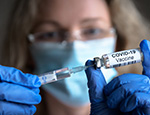 Unvaccinated individuals with heart problems up to 9 times more likely to die or suffer serious complications from COVID-19
Unvaccinated individuals with heart problems up to 9 times more likely to die or suffer serious complications from COVID-19

Researchers from Queen Mary University of London have combined evidence from 110 previous Covid-19 studies and found that unvaccinated individuals who contract the virus when they already have high blood pressure, diabetes or major heart damage are up to nine times more likely to suffer serious outcomes - including death, lung failure, admission to intensive care and kidney problems.
Date added: Wednesday, May 4, 2022
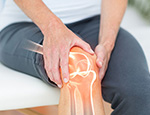 Queen Mary researcher awarded funding for research project which aims to develop safer drugs for autoimmune diseases
Queen Mary researcher awarded funding for research project which aims to develop safer drugs for autoimmune diseases

Dr Trinidad Montero-Melendez from the William Harvey Research Institute has been awarded £72,633 from Versus Arthritis, The Lorna and Yuti Chernajovsky Biomedical Research Foundation and Connect Immune Research to develop new treatments to tackle the root of life-changing autoimmune conditions.
Date added: Thursday, May 12, 2022
 New study shows genes can predict response to arthritis treatment and paves the way for future drug development
New study shows genes can predict response to arthritis treatment and paves the way for future drug development

New research from Queen Mary University of London, published in Nature Medicine, has shown that molecular profiling of the diseased joint tissue can significantly impact whether specific drug treatments will work to treat rheumatoid arthritis (RA) patients.
Date added: Thursday, May 19, 2022
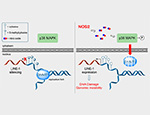 How chronic inflammation results in DNA damage and hypomethylation associated with cancer initiation
How chronic inflammation results in DNA damage and hypomethylation associated with cancer initiation

A new study led by researchers at Queen Mary University of London describes how chronic inflammation leads to altered, tumour-like epigenetic state and the re-expression of ancient, gene-editing retrotransposons that induce DNA damage.
Date added: Monday, May 30, 2022
 New study links greater pericardial fat to poor cardiovascular health
New study links greater pericardial fat to poor cardiovascular health

New research from Queen Mary University of London, published in the European Heart Journal of Cardiovascular Imaging, has shown that pericardial fat may have a role in driving structural and functional damage to the heart.
Date added: Monday, June 6, 2022
.jpg) Obesity linked to damaging changes in failing hearts
Obesity linked to damaging changes in failing hearts
.jpg)
Obesity is linked to changes in the structure and pumping action of the heart before it develops heart failure, according to research funded by the British Heart Foundation (BHF) and presented at the British Cardiovascular Society conference in Manchester.
Date added: Thursday, June 9, 2022
 Daily beetroot juice could help people with common heart condition
Daily beetroot juice could help people with common heart condition

A regular glass of beetroot juice can reduce signs of inflammation in blood vessels that are known to be increased in people with coronary heart disease, according to new research funded by the British Heart Foundation (BHF) and presented at the British Cardiovascular Society conference in Manchester.
Date added: Thursday, June 9, 2022
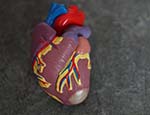 New study reveals insights in the genetic architecture of right ventricular structure and function
New study reveals insights in the genetic architecture of right ventricular structure and function

The study, published in Nature Genetics, provides the first large scale insight into the genetic basis for the function and structure of one of the most important parts of the heart, the right ventricle (RV).
Date added: Tuesday, June 14, 2022
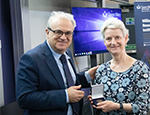 William Harvey Annual Research Review 2022
William Harvey Annual Research Review 2022

After two years as an online event, the William Harvey Annual Research Review returned to Charterhouse Square on Monday 27th of July.
Date added: Thursday, June 30, 2022
 Could a short low-intensity stimulation of the ear lower blood pressure? World’s first trial begins recruitment
Could a short low-intensity stimulation of the ear lower blood pressure? World’s first trial begins recruitment

Afferent Medical Solutions Ltd in collaboration with researchers from Queen Mary University of London are running a clinical trial to determine if its AffeX device can reduce blood pressure by delivering a low voltage current to the specific region of the ear on a periodic basis.
Date added: Wednesday, August 24, 2022
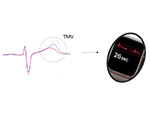 Could T-wave morphology on a single-lead ECG heartbeat help to identify people at risk of sudden cardiac death?
Could T-wave morphology on a single-lead ECG heartbeat help to identify people at risk of sudden cardiac death?

A joint collaboration involving researchers from Queen Mary University of London, University College London (UCL) and the University of Oulu has identified T-wave morphological variations (TMV), measured from a single beat single-lead electrocardiogram (ECG), as a strong predictor of sudden cardiac death (SCD) in low- and high-risk populations.
Date added: Tuesday, August 30, 2022
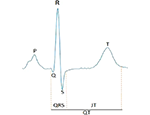 Researchers discover new genetic loci, pathways, therapeutic targets, and relationships with cardiovascular disease based on QT interval anomalies
Researchers discover new genetic loci, pathways, therapeutic targets, and relationships with cardiovascular disease based on QT interval anomalies

In a new study, published in Nature Communications, researchers from Queen Mary University of London have performed the largest multi-ancestry genetic analysis to date (>250,000 individuals), for markers derived from the electrocardiogram (ECG) that capture cardiac electrical activity in the heart ventricles.
Date added: Tuesday, September 6, 2022
 Excellence in neuroendocrinology: Márta Korbonits receives the international Rolf Gaillard Prize
Excellence in neuroendocrinology: Márta Korbonits receives the international Rolf Gaillard Prize

Queen Mary University of London is pleased to announce that has received the prestigious Rolf Gaillard Prize from the European Neuroendocrine Association (ENEA).
Date added: Wednesday, September 7, 2022
 Two thirds of atrial fibrillation patients on dual-antithrombotic therapy are prescribed the medication for too long, increasing the risk of internal bleeding
Two thirds of atrial fibrillation patients on dual-antithrombotic therapy are prescribed the medication for too long, increasing the risk of internal bleeding

An observational study of people with the heart condition atrial fibrillation, published by a student of Queen Mary’s Wellcome Trust-funded PhD programme: Health Data in Practice, has found that almost 2 in 3 (65.9%) patients on dual-antithrombotic therapy (DAT) receive the treatment for more than 12 months. This is considered too long and puts the patient at increased risk of bleeding complications.
Date added: Thursday, September 15, 2022
 Healthcare workers more than three times as likely to have experienced burnout during the COVID-19 pandemic
Healthcare workers more than three times as likely to have experienced burnout during the COVID-19 pandemic

Healthcare professionals working during the coronavirus (COVID-19) pandemic are up to 3.3-times more likely to be burned out compared to non-healthcare professionals, despite the rates of mental health issues being similar, according to new research led by Queen Mary University of London.
Date added: Tuesday, September 27, 2022
 Queen Mary researcher elected to join the committee of the British Society for Cardiovascular Research
Queen Mary researcher elected to join the committee of the British Society for Cardiovascular Research

Congratulations to from Queen Mary University of London, who was recently elected to the committee of the British Society for Cardiovascular Research (BSCR).
Date added: Monday, October 3, 2022
 Children and young adults with Down Syndrome four times more likely to have diabetes
Children and young adults with Down Syndrome four times more likely to have diabetes

Children and young adults* with Down Syndrome are four times more likely to be diagnosed with diabetes, according to new research led by Queen Mary University of London and King’s College London.
Date added: Tuesday, October 4, 2022
 Study of over 5 million people’s DNA reveals genetic links to height
Study of over 5 million people’s DNA reveals genetic links to height

An international team of researchers, including experts from Queen Mary University of London and the GIANT consortium, have identified over 12,000 genetic variants that influence a person’s height.
Date added: Wednesday, October 12, 2022
 Funding boost to help develop targeted healthcare for patients in east London
Funding boost to help develop targeted healthcare for patients in east London

Barts Health NHS Trust have received £20.9 million in funding from the National Institute for Health and Care Research (NIHR), providing a major boost to their plans to tackle health inequalities and deliver pioneering, innovative healthcare to the people of east London and beyond.
Date added: Friday, October 14, 2022
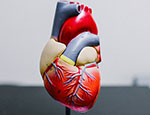 Large UK Biobank study finds COVID-19 infection is linked to subsequent poor cardiovascular health
Large UK Biobank study finds COVID-19 infection is linked to subsequent poor cardiovascular health

Researchers from Queen Mary University of London find that people requiring hospital admission due to COVID-19 have a high risk of subsequent cardiovascular problems.
Date added: Wednesday, November 2, 2022
 New drug can successfully treat patients typically resistant to high blood pressure treatment
New drug can successfully treat patients typically resistant to high blood pressure treatment

A new drug called Baxdrostat has been shown to significantly reduce high blood pressure (hypertension) in patients who may not respond to current treatments for the condition, according to results from a phase II trial led jointly by a Queen Mary University of London researcher and colleagues at CinCor Pharma, USA.
Date added: Monday, November 7, 2022
 Hope for first blood test to detect deadly heart inflammation
Hope for first blood test to detect deadly heart inflammation

£50 blood test could improve diagnosis of myocarditis and help patients get lifesaving treatment earlier.
Date added: Thursday, November 24, 2022
 Large international study uncovers genes involved in heart disease
Large international study uncovers genes involved in heart disease

Scientists link dozens of new genome sites to coronary artery disease risk and pioneer a powerful method for illuminating the biological roots of common disease.
Date added: Wednesday, December 7, 2022
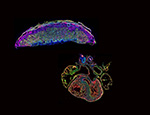 New study sheds light on how and why congenital heart diseases occur in the womb during pregnancy
New study sheds light on how and why congenital heart diseases occur in the womb during pregnancy

Researchers find that inflammation in the placenta and specifically inflammatory maternal immune cells impede normal heart development in the developing embryo, impacting the heart tissue’s function in the offspring’s adult life.
Date added: Tuesday, December 13, 2022
 Professor Amrita Ahluwalia appointed as the new Dean for Research
Professor Amrita Ahluwalia appointed as the new Dean for Research

Date added: Thursday, December 15, 2022